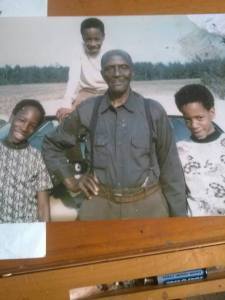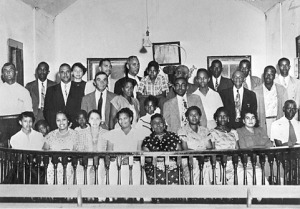It’s Black History Month. That short month of the year where we honor the many black contributions made in America. For 28 days, (29 if we’re lucky) we will talk about the same Black History heroes that have been passed down for generations.
I love Black History Month, but I believe that black history is made up of just as many unknown everyday heroes as the ones we all know about.
I’m going to take this moment to write about my black history hero- my model of holistic lifestyle and a patriarch of his many offspring- my great grandfather, Willie Holliday, Sr.
Why does he deserve this blog post?
Well, like many Black American heroes, Willie never received the recognition he deserved.
Willie was born sometime between 1892-and 1894 and lived until 2004…. That made him between 110 and 112 when he died. Although official birth records where rare for South Carolina sharecroppers, World War 1 registration papers and marriage certificates give a close idea to his actual birth date.
How rare are people like my grandpa Willie?
Probably not that unheard of…
Search the oldest black man on Google and you’ll find a list of men not unlike my grandfather.. living well beyond 100, yet getting very little recognition.
My grandfather’s name is not on there… and if it weren’t for the Internet, America (and my family) would likely forget the legacy of strength Black America has been built upon.
Sometimes, I would sit and think about why my grandfather’s name never received any recognition. Even when he turned 100 I wondered, why doesn’t everyone think this is a big deal? I’ll never forget Grandpa as he sat at his 100 year old birthday party, dressed in an all-white suit with a white top hat, lined with 100 one- dollar bills. I’m not sure he understood that the 100s of people there were all his descendants. He sat peacefully among his family, slowly nibbling on the cake with his face on it.
See, grandpa was born a sharecropper and he died sharecropper. Yes, he did some other things- raised 10 kids or so, became a deacon, etc.. but the majority of his life was spent in back-breaking farming in the hot South Carolina sun.
He worked the lands his father had, (when he had been born during the heights of the Civil War) the slave owners, the Plowden family, still depended on my family’s labor to support their livelihood. He raised his family in a small one-room shack, now dilapidated on the side of a state highway.
Willie was never revolutionary. Even when Thurgood Marshall came to town, urging his children to demand equal rights, Willie stayed quietly working, hoping for a better life for them in the big cities.
As Willie’s small town went to the Supreme Court in Briggs vs Elliot (precursor to Brown vs Board of Education), led by his cousin Henry Briggs, Willie continued to put food on the table. Equal education was great and all, but who wants to starve to death while fighting for a bus?
He fought his own battles however, manning the bells for the only black church in the county for years – which was more of a political meeting space than anything else. The bell was retired after he couldn’t make it to services… except for that one time they rang it again – at his funeral.
Willie was stoic, determined and healthy despite the dramas of World War 1, school desegregation, and the Great Depression. By the 1990’s he was comfortably living with his youngest daughter frying fish at will..
Because no one could fry fish the way he liked it.
My memories of Willie are of a strong black man, with a calm spirit, great sense of humor and a dedicated work ethic. He reminds me that not all battles have to be fought publically, that steady diet and exercise keeps the body healthy, and that a strong spirit brings peace- even in old age. Willie represents a generation of Black Americans that kept this country rolling… a generation that our society has built upon.
I say we find the everyday heroes in our families and give them the recognition they deserve!


